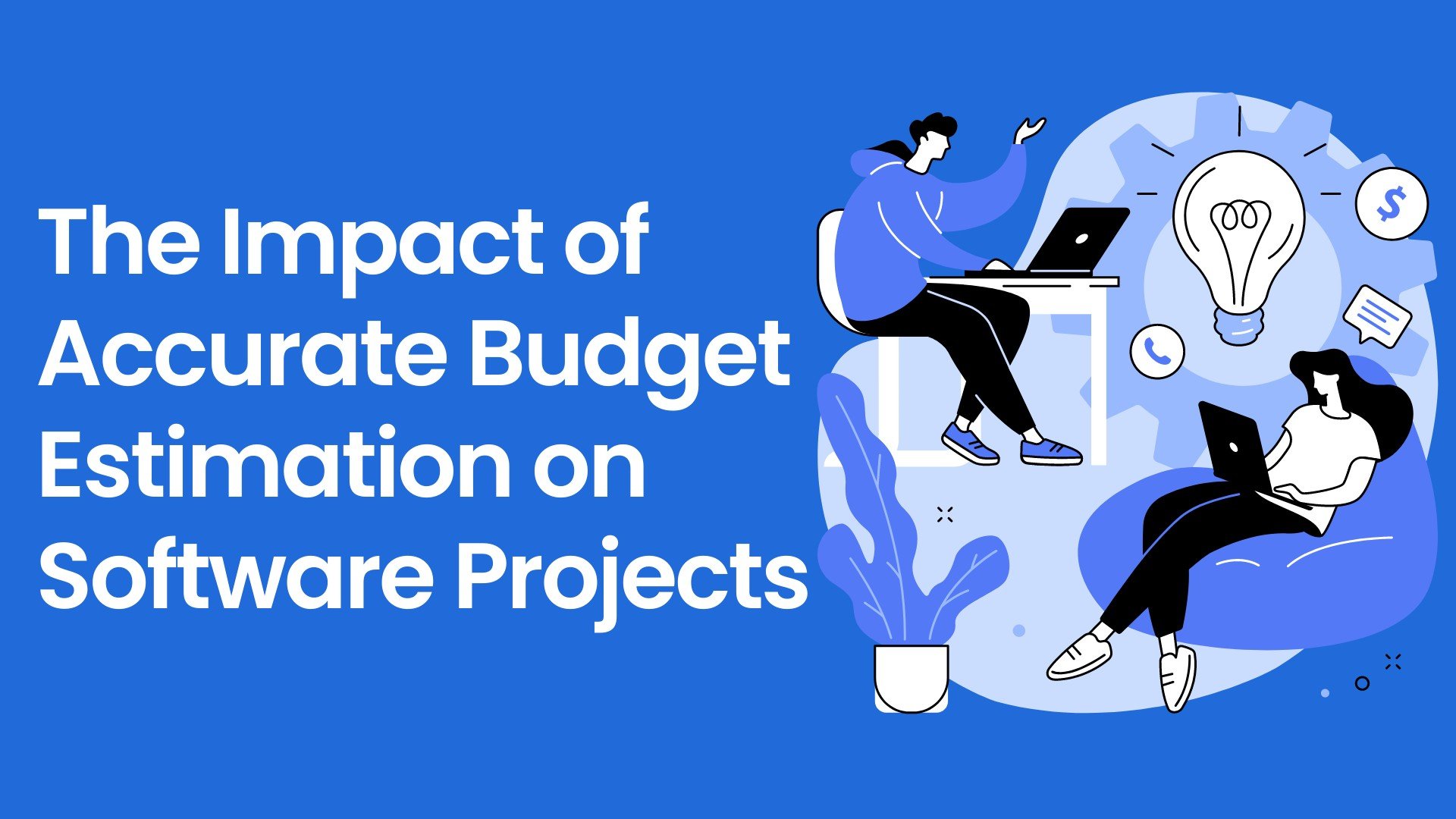This website uses cookies so that we can provide you with the best user experience possible. Cookie information is stored in your browser and performs functions such as recognising you when you return to our website and helping our team to understand which sections of the website you find most interesting and useful.
How Does Effective Budget Estimation Shape Your Software Development Project’s Journey?

Budget estimation is a critical aspect of software development projects. It plays a significant role in shaping the entire journey of a project, from its inception to completion. Understanding the importance of budget estimation in Custom software development is crucial for project managers and stakeholders alike. In this article, we will explore the role of budget estimation in project management, how it affects project scope, the steps to create an effective budget estimation, the impact of accurate budget estimation on Software Development projects, case studies showcasing successful projects with accurate budget estimation, and common mistakes to avoid in budget estimation.
Understanding the Importance of Budget Estimation in Software Development
Effective budget estimation is essential for successful software development projects. It allows project managers and stakeholders to gain a clear understanding of the financial resources needed to fulfill project goals and objectives. Moreover, accurately estimating the budget helps in planning, allocating resources, and managing project risks effectively.
The primary importance of budget estimation lies in its ability to provide a roadmap for the project’s financial requirements. Without a well-defined budget, projects can easily go overboard with expenses, leading to financial instability and the potential failure of the project.
When it comes to software development, there are various factors that need to be considered during budget estimation. These factors include the complexity of the project, the size of the development team, the technologies and tools required, and the anticipated timeline for completion. Each of these factors adds a layer of complexity to the budget estimation process.
Furthermore, budget estimation is not a one-time activity. It is an ongoing process that needs to be revisited and adjusted throughout the project lifecycle. As the project progresses and new requirements emerge, the budget estimation needs to be updated to reflect these changes. This ensures that the project stays on track financially and avoids any surprises down the line.
The Role of Budget Estimation in Project Management
Budget estimation is a fundamental aspect of project management, serving as a guiding compass for allocating resources and making financial decisions. It helps in determining the feasibility and viability of a project, enabling project managers to assess whether the project aligns with the available financial resources.
Moreover, budget estimation enables project managers to identify potential risks and challenges that may arise during the course of the project. By having a clear understanding of the budget, project managers can proactively plan for these risks and allocate resources accordingly. This helps in minimizing the impact of unforeseen circumstances and ensures that the project stays on track.
Furthermore, budget estimation allows project managers to track and control project expenses, ensuring that the project stays within the allocated financial limits. It provides transparency and accountability, enabling stakeholders to have a clear understanding of how the project’s funds are being utilized.
Additionally, budget estimation plays a crucial role in decision-making processes. It helps project managers prioritize tasks and allocate resources based on their financial feasibility. This ensures that the project moves forward in a systematic and efficient manner, maximizing the utilization of available resources.
How Budget Estimation Affects Project Scope
Accurate budget estimation has a direct impact on project scope. It plays a significant role in determining the project’s boundaries and the deliverables that can be achieved within the allocated budget. By having a realistic budget estimation, project managers can set clear expectations for the project’s scope, helping prevent scope creep and budget overruns.
When budget estimation is inadequate, projects may face challenges in delivering all the desired functionalities and features within the available resources. This can result in compromised quality, delayed timelines, and ultimately, dissatisfaction among stakeholders.
On the other hand, if the budget estimation is too conservative, it may lead to underutilization of resources and missed opportunities for innovation and improvement. Therefore, striking the right balance in budget estimation is crucial for project success.
Furthermore, budget estimation also affects the project’s risk management strategy. By accurately estimating the budget, project managers can allocate appropriate resources to mitigate potential risks. This ensures that the project is well-prepared to handle any unforeseen circumstances and minimizes the impact on the project’s scope and timeline.
In conclusion, budget estimation is a critical aspect of software development projects. It provides a roadmap for financial planning, allocation of resources, and risk management. By accurately estimating the budget, project managers can ensure project success, prevent scope creep, and deliver high-quality Software Development within the allocated financial resources.
Steps to Create an Effective Budget Estimation

Creating an effective budget estimation requires a systematic approach. Following the steps outlined below can help project managers in developing a reliable budget estimation:
Identifying and Categorizing Costs
The first step in budget estimation is to identify and categorize all the costs associated with the project. This includes direct costs such as salaries, hardware, software licenses, and infrastructure expenses, as well as indirect costs like training, documentation, and contingency funds.
Segmenting costs into different categories helps in gaining a comprehensive view of the project’s financial requirements, ensuring that no expenses are overlooked during estimation.
For example, when categorizing costs, project managers may consider dividing them into fixed costs and variable costs. Fixed costs are expenses that remain constant regardless of the project’s scale or duration, such as salaries and software licenses. On the other hand, variable costs are expenses that fluctuate based on the project’s needs, such as infrastructure expenses and training costs.
By categorizing costs in this manner, project managers can better understand the financial implications of the project and make informed decisions.
Estimating Time and Resources
Once costs are identified, it is essential to estimate the time and resources required for each task or activity. This involves breaking down the project into smaller components, determining the effort required for each, and associating the necessary resources and costs accordingly.
Estimating time and resources accurately is crucial for budget estimation, as it helps project managers allocate the right amount of financial resources to each task, ensuring that the project progresses smoothly without resource constraints.
For instance, project managers may use techniques such as Work Breakdown Structure (WBS) to break down the project into manageable tasks. Each task is then assigned an estimated duration and the resources required, including personnel, equipment, and materials.
By estimating time and resources in detail, project managers can identify potential bottlenecks, allocate resources effectively, and prevent delays or cost overruns.
Factoring in Unexpected Expenses
It is crucial to consider unexpected expenses or contingencies when creating a budget estimation. Unexpected expenses can arise due to unforeseen circumstances such as hardware failures, changes in project requirements, or external factors affecting the project’s timeline and scope.
By allocating a separate contingency fund within the budget estimation, project managers can handle unforeseen expenses without impacting the project’s progress or jeopardizing its financial stability.
When factoring in unexpected expenses, project managers may consider conducting a risk assessment to identify potential risks and their financial implications. This assessment helps in quantifying the impact of each risk and determining the appropriate amount to allocate for contingencies.
Moreover, project managers can also consider incorporating a buffer in the budget estimation to account for uncertainties and fluctuations in the market or industry. This buffer provides an additional layer of financial protection and ensures that the project remains financially viable even in uncertain circumstances.
By considering unexpected expenses and incorporating contingency measures, project managers can mitigate financial risks and maintain the stability of the project’s budget.
The Impact of Accurate Budget Estimation on Software Development Projects

Accurate budget estimation has several positive impacts on Software Development projects, significantly enhancing their overall success and sustainability. Let’s explore some of the key impacts:
Enhancing Project Efficiency and Productivity
Accurate budget estimation allows project teams to plan and allocate resources effectively. With a clear understanding of the financial constraints, teams can optimize their efforts, streamline processes, and eliminate unnecessary expenditures. This leads to improved project efficiency and increased productivity.
When teams are aware of the budget limitations, they tend to make better decisions regarding resource utilization, ensuring that the allocated funds are maximized to achieve the desired project outcomes. For example, they may prioritize tasks based on their importance and allocate resources accordingly. This not only saves time and effort but also minimizes the risk of overspending.
Furthermore, accurate budget estimation enables project managers to identify potential bottlenecks and allocate resources strategically. By having a realistic estimate of the project’s financial requirements, they can proactively address any resource constraints, ensuring smooth progress and timely delivery.
Reducing Financial Risks and Uncertainties
Accurate budget estimation helps in reducing financial risks and uncertainties associated with software projects. By having a realistic budget estimation, project managers can identify and manage potential financial risks more effectively.
For instance, they can anticipate any unexpected expenses that may arise during the project and allocate contingency funds accordingly. This proactive approach minimizes the impact of financial surprises, ensuring that the project stays within the allocated budget.
Furthermore, accurate budget estimations provide a reliable financial foundation for decision-making. This enables stakeholders to make informed choices, reducing the likelihood of financial surprises and ensuring smoother project execution. With a clear understanding of the project’s financial constraints, stakeholders can align their expectations and priorities accordingly.
Improving Stakeholder Confidence and Satisfaction
Accurate budget estimation plays a crucial role in building stakeholder confidence and satisfaction. When the project team delivers the expected outcomes within the estimated budget, stakeholders develop trust in the project management capabilities.
By meeting stakeholders’ expectations regarding budget constraints, project managers enhance credibility and strengthen relationships, instilling confidence in future endeavors. This can lead to increased support and cooperation from stakeholders, which is essential for the success of any software project.
Furthermore, accurate budget estimations enable project managers to communicate effectively with stakeholders throughout the project lifecycle. They can provide regular updates on the financial status, ensuring transparency and building trust. This open communication fosters a collaborative environment and promotes stakeholder satisfaction.
Case Study: Successful Software Projects Thanks to Accurate Budget Estimation
Several real-life case studies exemplify the positive outcomes of accurate budget estimation in software projects. Let’s examine two noteworthy examples:
Case Study 1: RV Technologies Softwares Pvt Ltd
RV Technologies Softwares Pvt Ltd, a leading software development firm, undertook a software project and invested considerable effort in budget estimation. By accurately estimating the project’s financial requirements upfront, the project team could efficiently allocate resources, manage risks, and deliver the project within the expected budget.
Thanks to the accurate budget estimation, RV Technologies Softwares Pvt Ltd could exceed stakeholder expectations, delivering a high-quality product while maintaining financial stability. This success story showcased the importance of accurate budget estimation in ensuring project success.
Case Study 2: Software Planet Group Ltd
Software Planet Group Ltd, a software startup, embarked on a project aimed at developing a mobile application. The project team performed thorough budget estimation, considering various cost categories and potential risks.
Using the accurate budget estimation as a framework, Software Planet Group Ltd successfully executed the project within the prescribed budget. This allowed the startup to secure positive feedback from stakeholders and attract additional funding for future projects.
Common Mistakes in Budget Estimation and How to Avoid Them
While accurate budget estimation brings immense benefits, there are common mistakes that project managers should avoid:
Underestimating Costs
Underestimating costs is a common mistake that can lead to budget overruns and project delays. It is crucial to conduct thorough research, obtain quotes from vendors, and consider realistic cost factors to ensure that estimates align with actual expenses.
Overlooking Contingency Funds
Failure to allocate a contingency fund for unexpected expenses can pose significant risks to a project. It is essential to set aside a portion of the budget for unforeseen circumstances, enabling the project to adapt and overcome challenges without compromising its financial stability.
Neglecting to Update the Budget Estimate
Throughout the project lifecycle, changes and adjustments may occur, impacting the budget. Neglecting to update the budget estimate to incorporate these changes can lead to inaccurate financial planning and budget imbalances. Regularly reviewing and revising the budget estimation ensures that it remains accurate and reflective of the evolving project requirements.
In conclusion, effective budget estimation plays a crucial role in shaping the journey of a software project. It helps project managers in planning, allocating resources, and managing risks effectively. Accurate budget estimation enhances project efficiency, reduces financial risks, and boosts stakeholder confidence. By learning from successful case studies and avoiding common mistakes, project managers can ensure accurate budget estimation, leading to successful software projects.



